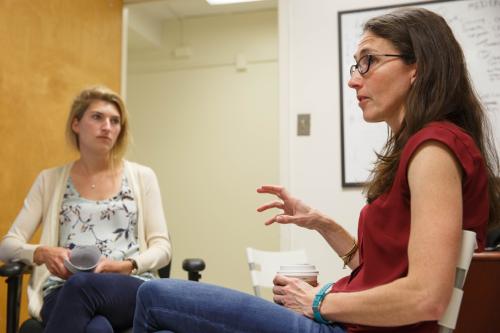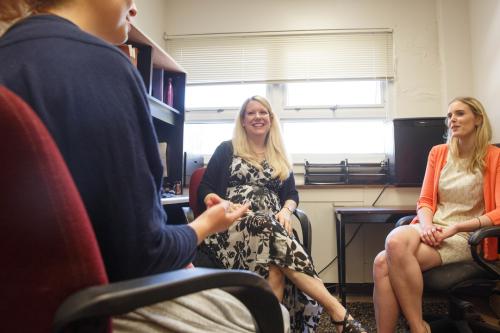PhD in Applied Social Psychology
The Applied Social Psychology Program at the George Washington University applies social psychological theories (e.g., attitudes, social cognition, social influence and decision making) and methods (i.e., experimental, quantitative, qualitative and mixed methods research) to understand and address several areas. These areas include the effects of people’s thoughts and behaviors on health issues such as substance use, obesity, sexual risk behaviors, physical activity and sun exposure; the influence of social issues like prejudice and discrimination on substance use, HIV risk and mental health; and the role of diversity — race, ethnicity, gender, LGBT identity, socioeconomic status, physical ability and the intersection of these social categories/identities — on health disparities and inequities.
"The program [shows] an unwavering commitment to integrate research on identity as central to the field."
Laurel Peterson
PhD '12, Applied Social Psychology
Location and Opportunities
In addition to the academic curriculum, students supplement their portfolio of skills through unique internships that address major social and organizational issues. Our location in the nation's capital offers students the opportunity to conduct research in consulting firms, government agencies, health care organizations, nonprofits and major corporations.
Faculty and Mentorship
Students work with faculty on everything from laboratory studies to theory-driven studies in local communities, giving students the opportunity to master multiple perspectives on human behavior. Students work with specific mentors who fit their research interests and help students gain key research skills and competencies.
Applied Social Psychology Faculty
New NIMH T32 Training Program for Select Students
- NIMH T32 Training Program in Approaches to Address Social-Structural Factors Related to HIV Intersectionally (TASHI)
The George Washington University is offering full doctoral scholarships* to prepare the next generation of community-engaged researchers to develop and lead social-structural and intersectional approaches to promote equity and improve HIV and related health outcomes. The training program is supported by 18 multi-disciplinary faculty conducting both global and domestic research on HIV, mental health, substance use, and violence.
Trainees will receive instruction and mentorship in the following:
- Social and structural, critical, and intersectional theory
- Community-engaged research design and methods
- Multi-level intervention development and evaluation
- Grant writing, publication and presentation skills
Trainees must apply and be accepted to the PhD program. Individuals from underrepresented populations are strongly encouraged to apply. To learn more about TASHI, visit the TASHI website or email tashi
 gwu [dot] edu.
gwu [dot] edu.*Full Scholarships include tuition, living expenses, and health insurance.
Drs. Lisa Bowleg and Deanna Kerrigan, TASHI Co-Program Directors
Course Requirements
The following requirements must be fulfilled:
The general requirements stated under Columbian College of Arts and Sciences, Graduate Programs.
72 credits, including 24 credits in core requirements, at least 30 credits in elective courses, at least 12 credits in dissertation research, successful completion of the program's candidacy assessment process (outlined below), and the completion and successful defense of a dissertation.
| Code | Title | Credits |
|---|---|---|
| Required core | ||
| Applied social (9 credits) | ||
| PSYC 8253 | Social Cognition | |
| PSYC 8254 | Social Influence | |
| PSYC 8277 | Health Psychology | |
| Methods/statistics (15 credits) | ||
| PSYC 8202 | Psychological Research Methods and Procedures | |
| PSYC 8205 | Multiple Regression Analysis in Psychological and Social Sciences | |
| PSYC 8206 | Multivariate Analysis and Modeling | |
| and two additional methods/statistics courses selected with the approval of the faculty advisor. | ||
| Electives | ||
| At least 30 credits. Recommended courses are listed below; other PSYC courses or courses from other departments may be selected with the approval of the faculty advisor. | ||
| PSYC 8257 | Current Topics in Social Psychology | |
| PSYC 8258 | Qualitative Research and Analysis | |
| PSYC 8279 | Special Topics in Health Psychology | |
| PSYC 8261 | Introduction to Machine Learning for Applied Psychology | |
| PSYC 8295 | Independent Research | |
| PSYC 8998 | Advanced Reading and Research | |
| Dissertation | ||
| At least 12 credits. | ||
| PSYC 8999 | Dissertation Research | |
| Candidacy assessment process | ||
| To advance to candidacy, students must successfully complete a second-year paper, 45 credits of coursework, a comprehensive examination, and a dissertation proposal. | ||
"The Applied Social Psychology program provided me with the skills and knowledge necessary to design and implement interventions for vulnerable populations in my current work: addressing tobacco-related health disparities among low-income populations."
Natalie Alizaga
PhD ’17, Applied Social Psychology





